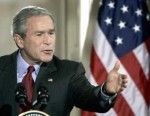What’s Left: Desperate Times

On January 1 of next year, the tax cuts implemented by former President George W. Bush are set to expire, effectively altering the tax bracket. There has been much talk about extending these tax cuts in order to alleviate the stress on the American consumer. However, while the extensions have support from both Democrats and Republicans, doing so would only cause more problems rather than fixing the current ones. They are regressive tax breaks that do little to help the American people as a whole and could be a deadly issue in the upcoming midterm elections. The best course of action is to let them expire, or better yet, only extend the tax cuts to middle class Americans or those whose incomes are less than $200,000.
Let’s first address the elephant in the room: the rising deficit. It’s no secret that America is so far in the hole, it doesn’t seem like there is much of a way out. We can’t sit idly by as we watch our debt rise and know that we will be the ones paying for it one day, not to mention the fact that it will be something that will affect our children and grandchildren as well. If we want to make any headway on this debt, we need to start now and not wait until the recession is over. If we do that, it might be too late, especially considering there appears to be no end in sight. I recognize the fact that this is a difficult time for the majority of Americans. Money is tight and having to pay more money to the government seems like a waste. That is why the tax cuts should only be extended to the middle class. This is what America needs the most. A bolstering economy depends on a vibrant middle class to consume and an extension of the tax cuts in this section of the tax bracket will do so. That way, we can still begin alleviating the debt by taxing the highest income bracket, or those with excess expendable income that don’t feel the throttle of the recession as much. There are accusations that this will deter investment and saving, but those who cite this as their main argument against the extension have a short-sided viewpoint. As national debt rises, the total amount of saving decreases overall. The government continues to spend money as well, which adds to the total investment occurring today.
There is also the danger that politicians run by supporting these extensions. Election Day is rapidly approaching and with the rise of the Tea Party, members of both parties are trying to appeal to the common man more than anything. While more taxes imply bigger government and no one likes the idea of more taxes, these tax breaks are, in essence, tax breaks that affect the wealthy the most. It would be near political suicide to attach yourself to these tax cuts and all of a sudden be labeled a supporter of Wall Street fat cats who line their pockets with crushed American dreams. While this may be a superficial argument, it is a valid one to make, considering this will not only affect current tax policy, but all other aspects of fiscal policy as this country moves to re-attain its prosperity. I can’t stress enough how these tax cuts cannot be extended. America needs to stop being so afraid of taxes and just relax for a minute. Times are tough. Money and jobs are hard to come by, but if we continue doing the same old things we will eventually find ourselves halted by our own debt. We can handle a three percent increase for now and good times will be coming soon enough.




